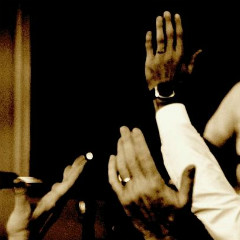One of the best ways to understand our position in God and how we approach him is to look to upraised hands. Worship tells us a lot about our relationship to God, where we fit in, and how. You don’t praise what’s not present, and you can’t give thanks for what has not been given.
There was a Greek monk named Symeon (he’s called “the New Theologian” even though he lived a thousand years ago) who wrote a collection of hymns. At the start of the collection is a prayer that says at one point, “Come, You Who have become desire itself in me and Who made me desire You, the utterly unapproachable one.”
It’s fitting that the prayer sits at the start of the collection because it reveals the truth just by its position: God sets desire in our hearts. He initiates, and we respond. This realization is the starting point of praise, the starting point of our relationship with God.
Recently reading Symeon’s words reminded me of the Apostle John’s: “Beloved, let us love one another, for love is of God; and everyone who loves is born of God and knows God…. In this the love of God was manifested toward us, that God has sent His only begotten Son into the world, that we might live through Him. In this is love, not that we loved God, but that He loved us and sent His Son to be the propitiation for our sins…. We love Him because He first loved us.”
There are and have been people (the heretic Pelagius comes to mind) who argue that humans can initiate the relationship. The Church has traditionally rejected this view because it affirms what John taught, that we would not desire without God first stirring that desire in us.
Worship teaches us the responsive nature of our love. As we thank God for his gifts we confess, implicitly and explicitly, that his love and grace and mercy came first.













